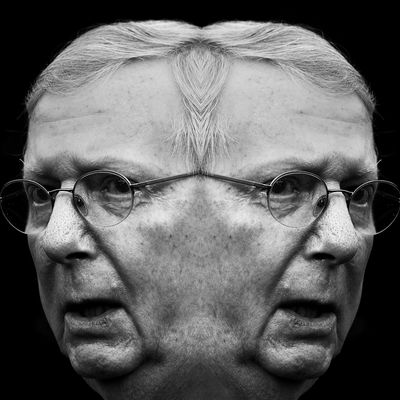
Nobody has ever suspected Mitch McConnell of being a man of deep and unchanging ideological principles. In a party increasingly dominated by conservative-movement and/or Trumpian ideologues, the Senate Majority Leader is an old-school deal maker whose idol is not Barry Goldwater or Ronald Reagan but the Great Compromiser Henry Clay.
Like Clay, McConnell is also known for the occasional prevarication, and he may have been caught in a big one just as he’s scrambling for votes for the Better Care Reconciliation Act of 2017, per a report from the Washington Post’s Paige Cunningham:
Here’s what McConnell has told several hesitant senators (including Portman and Sen. Shelley Moore Capito (R-W.Va.): The bill’s deepest Medicaid cuts are far into the future, and they’ll never go into effect anyway.
“He’s trying to sell the pragmatists like Portman, like Capito on ‘the CPI-U will never happen,’” a GOP lobbyist and former Hill staffer told me.
The backstory on this McConnell pitch makes it especially devious: from the beginning of the Senate’s consideration of Trumpcare, McConnell has not only maintained the long-term per capita cap on federal Medicaid spending that has upset and worried some “moderate” senators and Republican governors, but has made it tighter. The House-passed bill made the “cap,” which eliminated Medicaid’s original status as an open-ended entitlement program that covered the costs of eligible benefits for eligible individuals, subject to a “growth” adjustment based on medical inflation (the most common measuring is known as CPI-M). The Senate bill limited growth adjustments to consumer inflation (CPI-U measures that), a significantly lower figure. To make the number of people losing insurance under the cap less frightening, the tighter growth adjustment does not kick in until 2025.
A number of Republican senators — notably Susan Collins, Dean Heller, Shelley Moore Capito, and Rob Portman — made it clear the Medicaid cuts (which also included a quick phase-out of Obamacare’s Medicaid expansion option for the states) were very problematic. So after lots of quiet consultation the “new” version of Trumpcare was unveiled today — with virtually no changes in the Medicaid provisions.
To some extent this politically risky decision may just reflect McConnell’s broader strategy of nailing down conservatives with the broad provisions of the bill and then picking off moderates with this or that smaller concession or adjustment. It is, after all, the same strategy that worked for Paul Ryan in the House. And McConnell knows the Medicaid per capita cap is very important to conservatives who view it as perhaps their best shot at “entitlement reform” in years. “Caving” to moderates on that might have undermined conservative support not only in the Senate but in the House, which will ultimately have to approve whatever legislation McConnell can get through the upper chamber.
But the backloading of the really strict per capita cap in the Senate bill indeed made it possible for McConnell to say to moderates: Hey, 2025 is a long way off. You’ll have plenty of time to fight it down the road, and maybe the Democrats will get enough power to kill it themselves.
Unfortunately, this assurance isn’t worth much to moderates unless they repeat it publicly, and so it was inevitable McConnell’s whispers would leak immediately. And that may well cause bigger problems for conservatives than making the cap more generous.
As it happens, McConnell is touching a very raw nerve, as conservative health wonk Philip Klein illustrated in warning of exactly this contingency last month when the Senate bill was first unveiled:
[F]or opponents of Obamacare evaluating the proposal, the question boils down to whether to place more emphasis on the spending in the coming years or in the promised reforms in the next decade. Based on history and common sense, conservatives have every reason to place much more weight on the idea that the short-term spending is going to come through, and the promised spending cuts and reforms are very unlikely to ever be implemented….
If this bill passes as written, there’s very little reason to believe that the long-term spending reforms will ever see the light of day. But in the meantime, there’s every reason to bet on the fact that Congress will follow through on the hundreds of billions of dollars in spending it’s using to sustain Obamacare.
This is the fear McConnell is feeding as he tries to convince Republicans who are leery of big future Medicaid cuts that it’s all too mañana to worry about.
The irony is that McConnell may be correct insofar as passing this extremely unpopular bill will materially increase the odds that Democrats are in a position to repeal it after 2018 and 2020. That is probably not what either moderate or conservative Senate Republicans would regard as a compelling reason to send this big messy bill to the House and to Donald Trump’s desk.






























